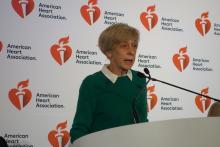CHICAGO – In what will surely come as a major disappointment to many millions of nutritional supplement enthusiasts, the daily use of vitamin D3 and/or omega-3 fatty acid capsules for a median of 5.3 years did not result in a lower incidence of invasive cancers or cardiovascular events than placebo in nearly 26,000 average-risk Americans who participated in the VITAL trial, JoAnn E. Manson, MD, reported at the American Heart Association scientific sessions.
VITAL (the Vitamin D and Omega-3 Trial) featured a 2x2 factorial design in which 25,871 subjects, including 5,016 black participants, were randomized in double-blind fashion to either vitamin D3, also known as cholecalciferol, at 2,000 IU/day and/or 1 g/day of omega-3 fatty acid, or placebo. The men had to be at least 50 years old, the women 55, and none had a baseline history of cardiovascular disease or invasive cancer. Their mean age was 67. Study pill adherence exceeded 83% over the course of 5.3 years.
This major study, funded by the National Institutes of Health, was designed to answer the question of whether two relatively inexpensive supplements with plausible mechanisms of potential benefit could be harnessed as effective agents for primary prevention of the two leading causes of death in the United States.
The simple answer turned out to be no. Invasive cancer of any type occurred in 793 patients in the vitamin D group and 824 placebo-treated controls, for a nonsignificant hazard ratio of 0.96. Major cardiovascular events – a composite of MI, stroke, or cardiovascular mortality – occurred in 396 and 409 patients, respectively, for a hazard ratio of 0.97.
Similarly, invasive cancer was diagnosed in 820 subjects in the omega-3 fatty acid group and 797 controls, while major cardiovascular events occurred in 386 patients taking fish oil and 419 on placebo. Again, the between-group differences were nonsignificant, noted Dr. Manson, chief of the division of preventive medicine and Brigham and Women’s Hospital and professor of medicine and women’s health at Harvard Medical School, Boston.
Buried within this vast data set were a few intriguing bright spots. For example, the prespecified secondary endpoint of total MIs was significantly reduced by 28% in patients using omega-3 fatty acid compared with placebo. In nonprespecified exploratory analyses, the risk of PCI was decreased by 22% in the omega-3 fatty acid group and total coronary heart disease events - a composite of MI, revascularization, or death due to coronary heart disease – was reduced by 17%. In black subjects, the use of omega-3 fatty acids reduced the risk of MIs by 77%.
Dietary fish consumption interacted with the effects of omega-3 supplementation. Subjects in the omega-3 group who ate less than the median 1.5 servings of fish per week had a statistically significant 19% relative risk reduction in major cardiovascular events and 40% fewer MIs than with placebo. In contrast, subjects who ate 1.5 or more fish servings derived no benefit from omega-3 supplements.
The most noteworthy finding in the vitamin D group was that, after excluding the first 2 years of follow-up, they had a 25% reduction in cancer mortality compared with controls.
However, Dr. Manson cautioned that these subgroup analyses should be interpreted with caution.
Discussant Jane Armitage, MD, went further, emphasizing that the primary study endpoints of invasive cancer and major cardiovascular events were negative for both vitamin D and fish oil.
“To drill down into the secondary endpoints is of some concern because I think there is often the risk of getting spurious results,” said Dr. Armitage, professor of clinical trials and epidemiology at the University of Oxford (England).
“I think the primary result that universal supplementation with vitamin D in a primary prevention population has not been shown to be beneficial is a robust result, and these other results need to be seen as hypothesis-generating,” according to Dr. Armitage.
She added that she thinks the VITAL trial is practice-changing.
“I think the general recommendation to take vitamin D is not supported by this paper,” she said.
The same holds true for omega-3 fatty acid supplementation based on the VITAL results, Dr. Armitage continued. She noted that the VITAL findings are consistent with a recent meta-analysis of 10 large trials of omega-3 which found no benefit in nearly 78,000 high-cardiovascular-risk subjects (JAMA Cardiol. 2018 Mar 1;3[3]:225-234).



